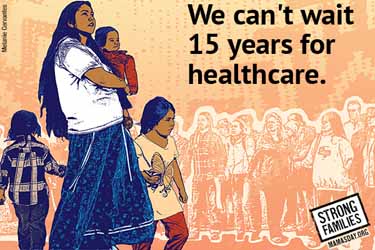Immigrant Women Should Not Have to Wait Years to Access Health Care
A provision included in an immigration reform bill could keep immigrant women from accessing essential health services for up to 15 years.

Most people hate waiting. We complain about lines or being put on hold. Right now, some politicians are looking to make immigrant women and their families wait to gain access to health care—a truly cruel thing on which to make someone wait. A provision included in an immigration reform bill could keep immigrant women from accessing essential health services for up to 15 years.
Specifically, the immigration reform bill that passed through the Senate includes language that bars an immigrant woman who is working to obtain citizenship from utilizing means-tested federal benefits like Medicaid for a minimum of ten years. She will also face a five-year delay under the current law if she does not naturalize as soon as possible, after the initial ten-year period.
The five-year waiting period was imposed on permanent, legal residents as an inclusion to the Affordable Care Act (ACA) for benefits like Medicaid. Given that the goal of the Medicaid program is to reduce financial barriers to essential health care for low-income families, this limitation affects those who already face tremendous obstacles to quality health-care services and do not have the ability to pay for care out-of-pocket.
Current policies will also make immigrant women ineligible for premium tax credits and subsidies to facilitate participation in the state health insurance marketplaces that are being established under the ACA. This places private health insurance plans out of reach for many families. All this means that an immigrant woman may have to wait up to 15 years—or more—before she can access affordable health coverage options.
Delayed access to preventive care like mammograms and Pap tests could be the difference between life and death for all women, including immigrant women. Lack of routine testing could mean that an undetected, untreated sexually transmitted infection could cause infertility. Holding back access to health services could have a dramatic effect on the health of individual women, their families, and their communities.
This kind of punitive, restrictive policy-making on the backs of women is all too familiar to many reproductive health advocates. Whether it is legislation that literally imposes a waiting period to delay a woman who is seeking abortion care or barring public hospitals from making agreements with abortion clinics to accept their patients in emergencies, we are used to seeing political games played with women’s health.
Hundreds of laws have been introduced in recent years with the goal of making it harder to get an abortion or closing clinics to shut off availability of care. With fewer providers, women are often forced to travel long distances to seek care; a recent Guttmacher Institute report estimates that in 2008, 16 percent of women traveled 25 to 49 miles, 11 percent traveled 50 to 100 miles, and 6 percent traveled more than 100 miles. This presents a particularly burdensome hardship for low-income women who may not have a car or be able to take time off from their job to travel. These restrictions also make abortion care more expensive by adding the cost of travel or child care or putting up so many extra hurdles that a woman is pushed later into pregnancy, when a procedure may be more complicated and costly.
The fact is that restrictions on abortion are designed to put care out of reach. This is especially true of policies that deny health insurance coverage of abortion in order to make it unaffordable. At the federal level, politicians have cut off care for women who use Medicaid or Medicare, as well as federal employees and their dependents, Peace Corps volunteers, military service members and their families, Native American women utilizing Indian Health Services, and women in federal prisons.
It is just as bad at the state level, where bills limiting public and private insurance coverage of abortion have been advanced and enacted for years. Right now, 20 states deny abortion coverage for plans that will be offered through the state health insurance exchanges that will be launched in 2014 under the ACA, including eight that ban coverage in all private insurance plans offered in that state. And 18 states withhold abortion coverage in insurance plans for public employees, while 35 states deny women coverage through their state Medicaid program.
These laws create unjust obstacles for all women, but they have a disparate impact on low-income women, immigrant women, and women of color. Instead of limiting access to health services or interfering with reproductive health decisions, policymakers should commit to improving access to health care for women and families and ensuring every woman has the ability to make the best health decision for her unique circumstances. That means we need laws and cultural conversations that make it easier for all women to raise their families in a safe and healthy environment and that provide health coverage for a full range of the health services that women need throughout their lives, including preventive care, but also pregnancy-related services like prenatal care, maternity care, and abortion care.
Unfortunately, that is not the political climate in which we live, so women wait. We wait to see if comprehensive immigration reform will be passed this year and if immigrant women will be left behind. We wait to see how many more dangerous and insulting limitations will be placed on our ability to make our own reproductive health decisions, including whether to choose adoption, seek abortion, or become a parent. But we don’t have to just wait. We can speak up. We can stand up. And we can demand that politicians stop pushing an extreme agenda that affects women’s health, our families, and our lives.
